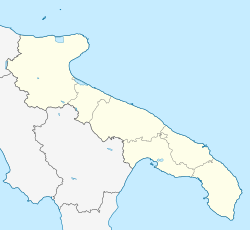Castelnuovo della Daunia | |
|---|---|
| Comune di Castelnuovo della Daunia | |
 | |
| Coordinates: 41°35′N15°7′E / 41.583°N 15.117°E | |
| Country | Italy |
| Region | Apulia |
| Province | Foggia (FG) |
| Government | |
| • Mayor | Guerino De Luca |
| Area | |
• Total | 61.49 km2 (23.74 sq mi) |
| Elevation | 600 m (2,000 ft) |
| Population (28 February 2017) [2] | |
• Total | 1,414 |
| • Density | 23/km2 (60/sq mi) |
| Demonym | Castelnovesi |
| Time zone | UTC+1 (CET) |
| • Summer (DST) | UTC+2 (CEST) |
| Postal code | 71034 |
| Dialing code | 0881 |
| Patron saint | Santa Maria della Murgia |
| Saint day | 15 September |
| Website | Official website |
Castelnuovo della Daunia (until 1863 just called "Castelnuovo") is an Italian municipality (comune) with 1365 inhabitants (December 31, 2018) in the province of Foggia in Puglia, Italy.
Contents

The municipality is located approximately 38 kilometers northwest away from Foggia and it borders directly on the province of Campobasso (Molise). [3] The town is known for its good air quality and mineral water from the La Cavallina spring.
Years ago, the water was used to be sold all over Italy. [4]






